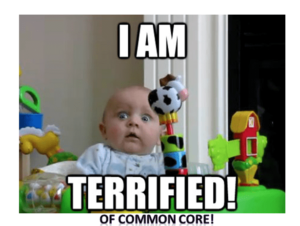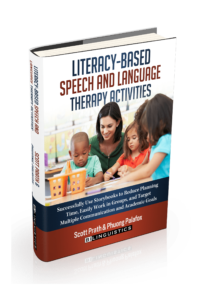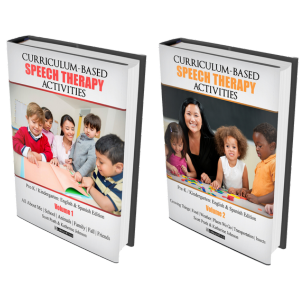I love alliteration. Speech-Language Pathologists speak soundly! Communication can conquer! However, for some reason, the words Common Core brings forth fear SLPs. For those who live in my state of Texas, this refers to the Texas Essential Knowledge and Skills (TEKS). For a majority of states in the United States, this refers to as the Common Core State Standards.
The Law

First, let’s talk about the law. Here are the three parts that we need to know:
- FAPE: All children need to have a Free and Appropriate Public Education.
- Access to the General Education: This means that all Individual Education Plans (IEPs) need to align to the general education curriculum.
- Least Restrictive Environment: Students should be provided special education services in the least restrictive environments.
Today we are going to talk about law #2. Because our IEPs need to consider the sentiments of the grade level curriculum, we are required to align them. So, that means that the goals of fourth grader working on his receptive and expressive language goals need to relate to this fourth grade state adopted curriculum standards. What?! We did not go to graduate school to do this. Where do I find the my state’s standards? My student is in the Life Skills classroom…is this appropriate?
Aligning to Curriculum
I promise that this goal is easier to accomplish than one may think. Here is the most important takeaway. We are speech-LANGUAGE pathologists. That means we are the experts in all-things-language. Speech-language therapy is a part of all academic curriculums. So, rest easy. By doing your job, you are likely addressing their curriculum expectations. Here is what you need to do:
- Talk to Grade Level Teachers: They can tell you EXACTLY the standards for their grade level. Tuck away the information. Voila! You have information for your students for that grade level for the remainder of your career.
- Specifically, check out your state standards for English Language Arts. I guarantee you will see very similar goals for speech-language therapy. This is where we get the most bang out of our time, and we are following the law of the land! Here are examples:
- Kindergarten
- With prompting and support, ask and answer questions about key details in a text.
- With prompting and support, identify characters, settings, and major events in a story.
- Fifth Grade
- Quote accurately from a text when explaining what the text says explicitly and when drawing inferences from the text.
- Determine a theme of a story, drama, or poem from details in the text, including how characters in a story or drama respond to challenges or how the speaker in a poem reflects upon a topic; summarize the text.
- Twelfth Grade
- Initiate and participate effectively in a range of collaborative discussions (one-on-one, in groups, and teacher-led) with diverse partners on grades 11-12 topics, texts, and issues, building on others’ ideas and expressing their own clearly and persuasively.
- Present information, findings, and supporting evidence clearly, concisely, and logically such that listeners can follow the line of reasoning and the organization, development, substance, and style are appropriate to purpose, audience, and task.
- Kindergarten
- Address the same topics/subjects as your general education teacher. This is surely alignment to the grade level curriculum.
- This could be reading the same books. For me, I like to get the names of the books about a month beforehand. This way, I work on the book with my speechy, magical skills (a.k.a., scaffolding, differentiating), and my student gets repeated exposure to the grade level book.
- This could be talking about the same historical figures. For example, I had a student in the Life Skills classroom with an intellectual disability. His 11th grade peers were learning about Ghandi. So, I made sure he learned about Ghandi. While focusing on Core Vocabulary, I made a book for him. Read this essay if you want to learn more about Core Vocabulary. Here’s what it looked like:

We Have Done the Work for You, SLPs.
So, SLPs, you’ve got this whole Curriculum Standards thing. If you would like a list of common curriculum standards related to speech-language therapy, check out our Literacy-Based Speech and Language Activities. It’s 200 pages of templates and tools to use with all ages to implement literacy-based interventions. Best part? It has lists of some of favorite books (for all ages) that are aligned to curriculum-based standards.




